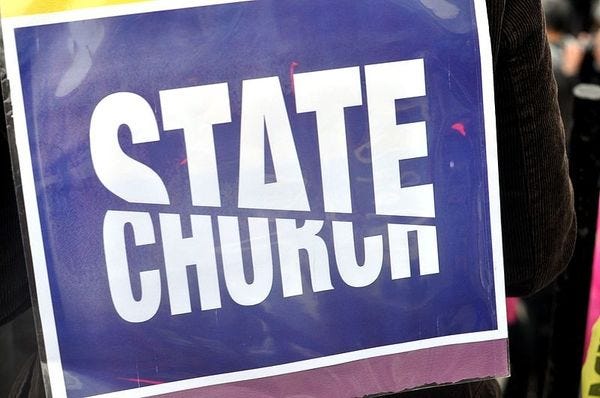An Obituary For The Separation of Church And State
We will miss you, Establishment Clause.
Establishment Clause
U.S. Const., amend. I, cl. 1
Born: December 15, 1791
Died: June 30, 2020
Oh separation of church and state. For nearly 230 years, you served us well. You will be missed.
Rest in Peace.
Yesterday, the Supreme Court handed down its ruling in Espinoza v. Montana , a case about whether the state of Montana is required to give tax credits to families sending their children to private, religious schools.
John Roberts reminded us all that he is, in fact, a conservative Republican, and sided with the Court's other conservatives to strike a major blow to the separation of church and state.
Let's break this down.
The First Amendment
The first part of the first Amendment says that the government
shall make no law respecting an establishment of religion, or prohibiting the free exercise thereof[.]
It's a great amendment that has served us well.
Separation of church and state used to be something that Americans cherished and fiercely protected. But throughout the years, it has come under attack by people who equate separation of church and state with discrimination.
The erosion of the Establishment Clause did not begin yesterday; religious fundamentalists have been going after it for decades. Only now, they're succeeding.
In 2017, the Court ruled in Trinity Lutheran v. Comer that the government couldn't refuse to give grants to religious schools simply because they're religious. And although Trinity Lutheran had a seemingly innocuous fact pattern about buying rubber playground surfaces, the ruling was much more dangerous than it may have appeared at first glance.
As Justice Sotomayor aptly wrote at the time, "In the end, the soundness of today's decision may matter less than what it might enable tomorrow."
Well, tomorrow is here.
Espinoza v. Montana Dep't of Revenue
Montana (and 37 other states ) have provisions in their state constitutions that prohibit the state from funding religious schools. So when the state started a program where residents could get tax credits for private schools if they donated to a scholarship program, a state court found the program could only be available for kids attending secular private schools. The state supreme court found that problematic because of the part of the amendment that says you can't prohibit the free exercise of religion and struck down the entire program.
The case really should have ended there, but the Supreme Court just couldn't pass up the opportunity to mandate state sponsorship of religion, so it decided to hear the case. We got a preview of where this was going to go at oral arguments back in January and it seemed likely that it was going nowhere good.
Writing for the majority, Roberts found that
A State need not subsidize private education. But once a State decides to do so, it cannot disqualify some private schools solely because they are religious.
As badass Justice Sotomayor wrote, this ruling is "perverse."
Without any need or power to do so, the Court appears to require a State to reinstate a tax-credit program that the Constitution did not demand in the first place. We once recognized that "while the Free Exercise Clause clearly prohibits the use of state action to deny the rights of free exercise to anyone, it has never meant that a majority could use the machinery of the State to practice its beliefs." Schempp , 374 U. S., at 226. Today's Court, by contrast, rejects the Religion Clauses' balanced values in favor of a new theory of free exercise, and it does so only by setting aside well-established judicial constraints.
The decision also struck a major blow to all 38 states with constitutional amendments prohibiting tax dollars paying for religious schools, with Roberts referring to Montana's constitutional provision implementing the Establishment Clause "a state law provision that expressly discriminates on the basis of religious status."
It's always fun to see how the Court changes its mind when religions that aren't Christianity are at stake. So yesterday, a lot of people asked our friends at The Church of Satan when they planned to open a school. They took the high road.
Many people are sending us this news asking when we plan to open a school. The answer is never. We oppose the indoc… https: //t.co/JCIX3bxQ3E
— The Church Of Satan (@The Church Of Satan) 1593555127.0
This case was a major win for people like Reichserziehungsminister Betsy DeVos , who has spent her entire career fighting for the right to discriminate, destroy public education , and indoctrinate schoolchildren. In fact, after weeks of attacking Roberts, the entire Trump regime celebrated yesterday's decision.
Amazingly though unsurprisingly, the opinion didn't go far enough for Justices Thomas, Gorsuch, and Alito. Thomas, joined by Gorsuch, wrote an absolutely bonkers concurrence arguing that the "Court's interpretation of the Establishment Clause continues to hamper free exercise rights[.]" And how does it do that, you ask? Because, in Thomas's (and apparently Gorsuch's) opinion, the Establishment Clause actually exists to let states individually choose their own official religions.
Yeah. They actually think states should be able to have and promote official state religions. It's fucking nuts.
This case also sees the inevitable return of Neil Gorsuch, Crackpot, as he subscribes to Clarence Thomas's long-run… https: //t.co/pbb1tSdtYo
— Scott Lemieux (@Scott Lemieux) 1593545353.0
And Alito wrote separately to inform us that really, the Court should go further and say that the dozens of state constitutional provisions enforcing separation of church and state are unconstitutional.
The case was brought by "libertarian" law office Institute for Justice, because apparently now it's libertarian to force the government to fund religious institutions.
Yeah, it's all dumb.
Discrimination is bad
The problem with government subsidies for religious schools isn't just the First Amendment or the potential damage to our public school system. It's also about discrimination.
As ACLU First Amendment lawyer Heather Weaver writes,
The court's ruling could effectively mean that, when states offer school vouchers or similar funding involving indirect aid — such as Montana's tax credit scholarship program — they now must extend the aid to religious schools, too. This is despite the fact that millions more in government funds will be diverted from public schools as a result, and taxpayer dollars will be used to support religious indoctrination and training for future religious leaders and adherents. This also means that the government will fund discrimination against minority-faith and LGBTQ students and job applicants, as well as students and prospective employees with disabilities, whom many religious schools refuse to admit or hire.
Indeed, our beloved Reichserziehungsminister DeVos has shown time and time again that she doesn't particularly care if religious schools discriminate against LGBTQ kids — or even kids who happen to have LGBTQ parents .
And LGBTQ families are not the only ones who stand to be discriminated against. As disability rights groups told the Court as amici, "most federal laws protecting students with disabilities do not apply to participating private schools."
Even when their private-school education is funded by public funds or forgone public revenue, those students lose nearly all the protection and services that they would have received in public school. In most cases, they give up the individual right to an appropriate education; the right to be educated in the least restrictive environment; many anti-discrimination protections; and safeguards against disability-based discipline. Their parents lose rights, too, including the right to be kept informed about their children's education and the right to protect their children before agencies and courts.
"[A]s a result," they told the Court, "private schools paid for by public funds routinely fail to serve students with disabilities adequately—and often refuse to serve these students at all."
And things could be about to get a lot worse. In the fall, the Court will hear arguments in Fulton v. City of Philadelphia , a case about whether government contractors have a constitutional right to discriminate against LGBTQ children and families.
In 2010, the Court ruled in Christian Legal Society v. Martinez that the government can refuse to fund entities that discriminate against groups of people. But that was a 5-4 decision with now-retired Justice Kennedy siding with the majority. Now in his place we have Kegs Kavanaugh, who really loved drinking and allegedly attempting to sexually assault women while at Jesuit Georgetown Prep and flipped out at oral arguments in this case.
Next term, the Court is set to hear Fulton v. City of Philadelphia , a challenge to a Philadelphia nondiscrimination law. Philly has a nondiscrimination ordinance that prohibits discrimination against same-sex couples. Organizations like Catholic Social Services lost their contracts with the city because they think their god requires them to discriminate against people simply because of who they are.
As Ian Millhiser writes for Vox , a ruling for the discriminatory religious organizations in Fulton would be "a legal earthquake, effectively permitting religious organizations to take money from the government even as they refuse to comply with anti-discrimination rules." And combined with the ruling in Espinoza , it could force the government to fund discrimination with our tax dollars.
So not only was yesterday's ruling a shitshow, but it also looks like the worst is still yet to come.
Happy Wednesday!

Here's the opinion. I recommend skipping straight to the dissents.
Follow Jamie on Twitter !
Do your Amazon shopping through this link, because reasons .
Wonkette is ENTIRELY funded by our readers. Please help us pay the writers, if you are able!




From Hobby Lobby to your doorstep.
America, you had this coming.
Fund public schools properly. 'School choice' is a scam to funnel poor people into trades and deny them Liberal Arts and Humanities - the topics that teach how to be a competent citizen of a modern democracy.